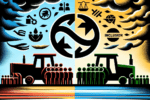West Sussex, England – In a significant development, inflation has hit the Bank of England’s target for the first time in nearly three years. Official figures reveal that prices rose by 2% in the year leading up to May, a decrease from the previous month’s 2.3%.
This noteworthy economic indicator comes amidst the upcoming general election on July 4th, where all major political parties are engaged in debates on strategies to manage the cost of living. With the economy taking center stage in the election discourse, the Bank of England is poised to make a decision on UK interest rates this Thursday.
Analysts anticipate that the bank will maintain the rate at 5.25% for the seventh consecutive meeting, with projections leaning towards a potential rate cut in August. The drop in May’s inflation figures can be attributed to a deceleration in price increases for food, soft drinks, recreation and culture, as well as furniture and household goods.
Furthermore, the notable surge in inflation to 11.1% in October 2022, the highest level in over 40 years, was primarily fueled by escalated energy and food prices following Russia’s invasion of Ukraine. These latest figures serve as the final major official economic statistics ahead of the general election, sparking crucial discussions among the main parties.
The Conservatives are expected to leverage the positive inflation data to bolster their narrative of an economic revival. On the other hand, Labour continues to emphasize concerns regarding the ongoing cost of living crisis, highlighting that food prices remain 25% higher than they were at the start of 2022, while petrol prices are once again on the rise.
Amidst these economic dynamics, Gary Wildman, owner of John Wildman & Sons butchers in West Sussex, shared insights on the pricing trends at his store. Wildman noted that prices have stabilized to some extent compared to the initial impact of the COVID-19 pandemic, although certain products like pork continue to witness price hikes. He emphasized the challenge of absorbing increased costs without passing them entirely onto customers, considering the impact on business margins.
It is worth noting that UK inflation is now increasing at its slowest rate since July 2021, positioning it below the inflation rates of the eurozone and the US. Notably, Italy stands out as the only G7 economy with lower inflation than the UK, underlining the complex interplay of economic factors influencing global markets.










